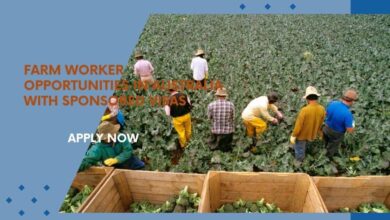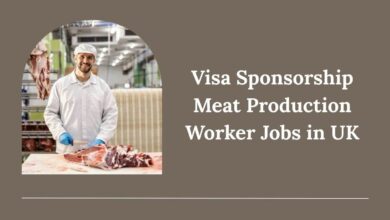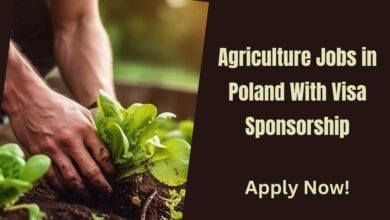UK Dairy Farm Jobs With Visa Sponsorship for Foreigners 2026

Working on a UK dairy farm is more than a job it’s a chance to be part of the heartbeat of British agriculture, earning£12.21 to £20.09 per hour while gaining hands-on experience. These roles suit anyone ready for physical outdoor work, caring for cows, milking, feeding, and maintaining the farm, with both short-term and long-term opportunities.
Whether you’re seeking a seasonal role or a pathway to stay longer, the work is rewarding, filled with learning, connection to nature, and the satisfaction of contributing to daily life across the country.
Why the UK Needs Dairy Farm Workers?
The dairy business in the UK is robust. Consider all of the milk, cheese, butter, and yogurt that are consumed on a daily basis, and then consider the people who provide that supply.
A large number of farms in Britain are small-scale or family-run businesses. To assist with feeding, cleaning, milking, and managing livestock, they mostly depend on laborers. Additionally, there has been an increasing need for foreign workers to fill these crucial positions in recent years due to labor shortages, particularly following Brexit.
Responsibilities of UK Dairy Farm Jobs:
- Milking: This is the core task. Workers operate and monitor milking machines, ensuring the process is efficient and hygienic. They prepare the cows for milking by cleaning their udders and checking for signs of infection, such as mastitis. After milking, they clean and sanitize the milking parlor and equipment to prevent contamination.
- Feeding and Watering: Workers are responsible for providing cattle with a balanced diet. This includes distributing feed, ensuring troughs are full of fresh water, and sometimes preparing specific feed mixtures. They must ensure the cows are getting the right nutrients for optimal health and milk production.
- Cleaning and Maintenance: Maintaining a clean environment is crucial for both animal health and milk quality. Workers regularly clean barns, stalls, and milking parlors, often using high-pressure hoses and other cleaning equipment to remove manure and debris.
- Animal Health and Welfare: Workers act as the first line of defense for the herd’s health. They monitor cows for any signs of illness, injury, or distress and report issues to the farm manager or a veterinarian. They may also assist with routine tasks like vaccinations, tagging, and hoof care.
- Calving and Calf Care: Dairy farm workers often assist cows during calving and are responsible for the well-being of newborn calves. This involves feeding them colostrum (the mother’s first milk), providing them with clean bedding, and monitoring their health as they grow.
- General Farm Maintenance: The job involves a variety of practical tasks, including repairing fences, maintaining basic farm equipment, and ensuring all areas of the farm are safe and functional.
Who Can Apply?
To apply for a dairy farm worker job in New Zealand, you must meet specific criteria related to age, experience, and personal traits. These jobs are available to both men and women, and while a typical age range is 21 to 45, older applicants with relevant experience are also considered.
Applicant Profile:
To be a good fit, you should be a person who:
- Enjoys hands-on work in an outdoor setting: Dairy farming is physical and involves working in all weather conditions.
- Is physically fit and can handle early mornings and demanding tasks like lifting and manual labor.
- Has experience working with livestock or on a farm. While not always mandatory, this is highly preferred and will make you a more competitive candidate.
- Has basic English communication skills. You must be able to understand and follow instructions and communicate with the farm manager and other team members for safety and efficiency.
- Is reliable, punctual, and willing to learn. Dairy farming is routine-based and requires a high level of dependability.
Visa Sponsorship Details:
1. Seasonal Worker Visa
This is the most common route for temporary farm labor, but it’s important to note that the UK’s Seasonal Worker visa is primarily for horticulture (picking fruit and vegetables) and poultry production. Dairy farming roles are not explicitly listed under this visa.
- Eligibility: You must be 18 or older and have a Certificate of Sponsorship from a licensed sponsor. You’ll need to demonstrate you have at least £1,270 in savings to support yourself, although this requirement can be waived if your employer certifies that they’ll cover your costs for the first month.
- Duration: The visa allows you to stay in the UK for a maximum of 6 months in any 12-month period.
- No Pathway to Settlement: This visa does not lead to permanent residency, and you cannot bring family members with you.
2. Skilled Worker Visa
A dairy farm worker can potentially be sponsored under a Skilled Worker visa, but this is less common for entry-level roles, as the job must meet specific skill and salary thresholds.
- Salary and Skill Threshold: The job must be at an eligible skill level, and the salary must meet the required threshold, which is typically whichever is higher: the general salary threshold (currently £41,700 per year) or the “going rate” for the specific job.
- Sponsor License: The dairy farm must hold a Skilled Worker sponsor license from the UK Home Office. They must also have a Certificate of Sponsorship for you.
- English Language Requirement: You must demonstrate a good command of English, usually by passing a recognized English language test.
- Path to Permanent Residency: Unlike the seasonal worker visa, the skilled worker visa can lead to permanent residency in the UK after a specified period, typically five years.
Salary:
The salary for a dairy farm worker can vary, but it’s generally above the National Living Wage. The National Living Wage in the UK for workers aged 21 and over is £12.21 per hour. Based on this, a typical dairy farm worker’s income would be:
- Average Wage: £12.21 to £20.09 per hour, depending on experience and location.
- Weekly Earnings: For a standard 40-hour workweek, this would be around £488–£803. However, farm work often involves longer hours.
- Monthly Income: A monthly income can range from approximately £1,950 to over £3,200.
Salaries in more remote or rural areas may be higher due to the difficulty in finding local staff. Senior roles or those with more responsibility, such as a farm manager, will earn a much higher salary.
Check Also: Dairy Farm Workers Jobs in England for Foreigners
Benefits of UK Dairy Farm Jobs:
The benefits that accompany the salary are given below:
- Visa Sponsorship
Many farms offer visa sponsorship for foreigners, making it easier to work legally in the UK and access long-term career opportunities. - Accommodation Provided
Some employers provide free or subsidized housing, helping workers save on living costs and live conveniently close to the farm. - Hands-On Outdoor Work
These roles allow you to work directly with animals and nature, offering an active, fulfilling, and physically engaging job. - Skill Development
Workers gain practical skills in animal care, milking, feeding, farm maintenance, and machinery handling, valuable for future farm careers. - Meal and Dairy Product Benefits
Many farms offer staff meals or include milk and dairy products, adding extra value and reducing daily expenses. - Career Progression
Starting as a worker can lead to senior roles such as farm manager, with higher pay and responsibilities over time. - Community and Team Environment
Working on a farm fosters a strong sense of teamwork and community, with support from colleagues and management. - Legal and Administrative Support
Sponsoring employers assist with visa applications, paperwork, and compliance, easing the stress of working abroad. - Pathway to Permanent Residency
With certain visas, like the Skilled Worker visa, employees can stay long-term and even apply for permanent residency after five years.
How to Apply for UK Dairy Farm Jobs With Visa Sponsorship for Foreigners?
1. Create a Simple CV
Your CV should be a concise, one-page document. Since you’re applying for a hands-on job, focus on practical experience and skills.
- Personal Information: Include your full name, nationality, and contact details (email and phone number, with the correct country code). Your age is not essential, but including it can be helpful.
- Experience: This is the most important section. List any experience you have in farm work, livestock handling, or physical labor. Highlight specific tasks you performed, such as operating machinery, milking cows, or maintaining fences. Even volunteer experience is valuable.
- Skills: Create a section for your skills. Emphasize your English language level (e.g., “Basic English for communication and safety”) and your physical health (“physically fit and able to lift heavy loads”).
- Motivation: End with a short statement about your willingness to relocate to the UK and work full-time on a farm. This shows your commitment.
2. Search on the Right Job Platforms
Searching on general job boards can be overwhelming. To find employers who offer visa sponsorship, you need to use targeted search terms and platforms.
- Targeted Search Phrases: Your suggested search phrases are perfect for finding the right jobs. Using terms like “visa sponsorship,” “for foreigners,” and “employment permit” will filter out jobs that are not open to international applicants.
- Job Platforms:
- UK Job Boards: Major sites like Indeed, Reed, and TotalJobs are great starting points. Many employers post jobs with the phrase “visa sponsorship available” in the description.
- Agricultural Recruitment Sites: There are specialist recruitment agencies that focus on the agricultural sector and work directly with farms to find staff. These agencies are often the best route to finding a sponsored job.
- Directly on Farm Websites: Larger dairy farms may have a “careers” section on their website.
- Recruitment Agencies: Contacting recruitment agencies that are specifically approved by the UK government to sponsor workers is an excellent strategy. They can assess your skills and match you with suitable employers.
Conclusion:
Dairy farm workers are vital to the UK’s dairy industry, handling milking, feeding, and animal care daily. These roles offer hands-on outdoor work with salaries ranging from £12.21 to £20.09 per hour, plus benefits like accommodation and meals. For foreigners, visa sponsorship and long-term opportunities make these positions both accessible and rewarding.
Frequently Asked Questions:
Do I need a degree to apply for a dairy farm job in UK
No. A degree is not required. Employers value physical fitness, reliability, and willingness to work. Experience with livestock is a plus.
How much do dairy farm workers earn in UK?
Workers earn between £12.21 and £20.09 per hour, averaging £1,950–£3,200 per month, depending on experience and location.




